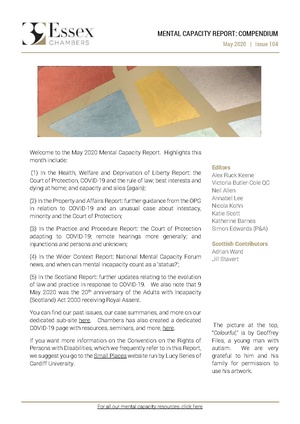Information for "London Borough of Tower Hamlets v A (2020) EWCOP 21"
Basic information
| Display title | London Borough of Tower Hamlets v A [2020] EWCOP 21 |
| Default sort key | London Borough of Tower Hamlets v A (2020) EWCOP 21 |
| Page length (in bytes) | 1,812 |
| Page ID | 10696 |
| Page content language | en - English |
| Page content model | wikitext |
| Indexing by robots | Allowed |
| Number of redirects to this page | 0 |
| Counted as a content page | Yes |
| Page image |  |
Page protection
| Edit | Allow only users with "editing" permission (infinite) |
| Move | Allow only users with "editing" permission (infinite) |
Edit history
| Page creator | Jonathan (talk | contribs) |
| Date of page creation | 09:02, 26 April 2020 |
| Latest editor | Jonathan (talk | contribs) |
| Date of latest edit | 23:32, 4 July 2023 |
| Total number of edits | 8 |
| Total number of distinct authors | 1 |
| Recent number of edits (within past 90 days) | 0 |
| Recent number of distinct authors | 0 |
Page properties
SEO properties
Description | Content |
Article description: (description)This attribute controls the content of the description and og:description elements. | (1) Residence and care decisions are usually considered as individual domains of capacity, in keeping with the MCA's "issue-specific" approach; residence and care decisions involve overlapping information and are not made in separate "silos"; overlap does not mean that a residence decision incorporates a care decision: it is not necessary to make a capacitous decision about care in order to make a capacitous decision about residence. What was required for A to make a capacitous decision about where she lives is a broad understanding of the sort of care which would be provided in each of the two places of residence potentially available to her. Although it was agreed that A lacked capacity to decide how she was cared for, it was decided that she had capacity to decide whether to continue to live in residential care or return to live in her own flat with a care package. (2) Legal Aid would have ended had the DOLS standard authorisation ended: in a postscript the judge decided that, as A had no choice until the home care package was available, "the determination that A lacks capacity to determine the care that she should receive necessarily means that she lacks capacity within the meaning of paragraph 15 of Schedule A1 (that "[t]he relevant person meets the mental capacity requirement if he lacks capacity in relation to the question whether or not he should be accommodated in the relevant hospital or care home for the purpose of being given the relevant care or treatment"). |